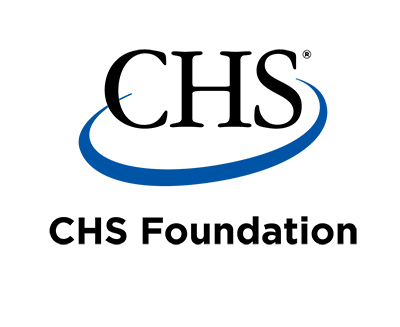NORFOLK, Neb. – Northeast Community College’s work of taking one of its agriculture programs on the road has received a financial boost that will allow for continued partnerships with a number of entities, including area high schools.
One aspect of the College’s Precision Agriculture program features a mobile learning simulator that is equipped with multiple hands-on mobile training modules to train current and future producers. The Precision Agriculture Learning (PAL) simulator is housed in a customized trailer that is taken to educational trainings and events across the College’s 20-county service area.
Dr. Tracy Kruse, vice president of development and external affairs and executive director of the Northeast Foundation, said the CHS Foundation, funded by charitable gifts from CHS, Inc., the nation’s leading farmer-owned cooperative, has awarded the College a three-year, $250,000 grant that will allow the purchase of additional curriculum and equipment that will provide more hands-on learning opportunities for producers and high school students across Northeast’s 20-county service area.
“The CHS Foundation understands the need for more highly trained members of the workforce in regard to precision agriculture,” Kruse said. “The foundation sees targeting students at the high school level as a critical way to build interest in a vocation that will address a huge demand in our region that can lead to well-paying careers in the industry.”
Students in Northeast’s Precision Agriculture program develop technical skills and learn to interpret, analyze, and utilize data gathered from precision agriculture technologies to improve production. Graduates are skilled to work as technicians and producers in a rapidly changing industry that is focused on maximizing yield potential through resource efficient practices.
Northeast began utilizing the PAL simulator program in 2017 after receiving a $785,000 grant from the National Science Foundation (NSF) that led to the development of first-level materials for use in high schools to provide hands-on learning experiences within the simulator.
Currently, the simulator includes a two-row precision planter that can change between hybrids or varieties with ease, a sprayer that can apply variable rate applications, and a meter test stand to show the importance of equipment calibration and maintenance. There are also soil moisture probes, which can help determine the amount of water required and the timing of its application for irrigators. The probes allow for financial and resources savings while reducing leaching of chemicals due to over-application.
College instructors also provide real-world examples using data archives gathered from Northeast Community College farm operations to show the relationships between annual environmental impacts, field characteristics and the results from the management decisions that are made based on those pieces of data. Students can see data in action similar to what they may experience it in their own operations.
Northeast Precision Agriculture Trainer Lonny Mitchell said the CHS Foundation grant will assist in preparing a future Precision Agriculture workforce through additional training tools, such as allowing students to practice installing equipment without the need of a full-scale combine.
“The primary thing this grant supports is building curriculum and providing training for high school ag teachers to bring precision ag education into their classrooms,”’ Mitchell said. “Until four years ago, this was extremely difficult, because there were no materials for teachers to use and they were not trained to develop that curriculum.”
Kylie Penke, agriculture and FFA instructor at Oakland-Craig High School, called the PAL simulator “icing on the cake” in enabling easy access to precision agriculture concepts, examples and experiences for her students. She said seeing sensors, meters and monitors at work in real time is invaluable to her students.
“All of the information shared in class starts to fall into place when the students see the monitor simultaneously keeping track of seed spacing, skips and doubles, and how those factors can dramatically affect gross income,” Penke said. “One quickly understands how granular data and applying inputs accordingly is much more profitable and more environmentally friendly than whole-farm management practices.”
She said the PAL simulator experience, especially over the past year, has been invaluable to her pupils.
“In a time where students are constantly missing activities throughout the year, I really appreciate when I can offer something as unique as the Precision Ag trailer-experience to all of my students, within the confines of one class period, without ever leaving school property!”
This is not the first time Northeast and the CHS Foundation have collaborated. The CHS Foundation contributed $50,000 to the Nexus campaign for construction of new agriculture facilities on the Acklie Family College Farm in Norfolk. In 2019, the College was named one of the foundation’s University Partners and now receives eight, $1,000 scholarships and a $2,000 mini-grant each year to support professional development opportunities provided through college clubs or organizations focused on agriculture.
In addition, the CHS Foundation provided $5,000 in student emergency funds to Northeast when the COVID-19 pandemic forced the College to close its campuses and hold all classes remotely. The funding supported students studying agriculture, providing them with essential resources to continue their education and assist with loss of income, financial support or stability, or lack of resources to effectively engage in studies remotely.
“The CHS Foundation is proud to build on our relationship with Northeast Community College,” said Nanci Lilja, president, CHS Foundation. “We’re excited to support the PAL simulator, so that more high school students can experience hands-on learning in precision agriculture.”
Mitchell said with the NSF grant concluding in mid-2021, the College is grateful to the CHS Foundation for seeing the value of its work with area high schools in precision agriculture.
“Because we were able to be in on the ground floor of partnering with our high school educators, this work has become known in states as far away as Indiana, Wisconsin, and Michigan. Educators from these states have made requests for information about the work we do and how to duplicate these efforts. It demonstrates how innovative and dynamic this program really is.”
To learn more about the CHS Foundation, visit chsfoundation.org.
--###--

